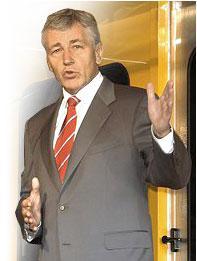To Senator Chuck Hagel, the war on terror is both "a historic and existential challenge", at least that is what he wrote in the July/August edition of Foreign Affairs in 2004.

There is, however, no reason to think that the Senator has changed his mind. Hagel (pictured, left) has garnered attention as of late for comparing Iraq to Vietnam -- invoking this analogy only insofar as public opinion, though media outlets missed that caveat. The historic and existential quality to the conflict in Iraq seems undeniable.
The American military and government overthrew a dictator who had ruled a disparate population with conflicting goals and cultures. Elements of that dictatorial government, militias derived from those varied populations and foreign actors remain engaged in a multidimensional conflict.
Pavel Baev of the Center for the Study of Civil War at the Peace Research Institute in Oslo, Norway said this week, in
The Christian Science Monitor: "What's happening in Iraq is a multidimensional conflict. There's international terrorism, banditry, the major foreign military presence. But the civil war is the central part of it - the violent contestation for power inside the country."
That point has greater import after a troubling week in Iraq. We have seen constitutional upheaval, an insurgent assault on Baghdad Wednesday and two days of conflict between rival Shiite groups. Further,
The Guardian reported this week of an insurgent stronghold in Haditha. The prospect of a stable Iraq is by no means a certainty, and may not even be a likelihood.
Yet, a destable Iraq is a existential threat to the United States and our allies.
Iraq, in its worst potential future manifestation, could be three regions with quesitonable boundries. A primarily Shiite south, with oil resources, could become a protectorate of Iran. At the very least, that region and the SCIRI militia named the Badr Brigade, will have sympathies to the Shiite state on its border. In a worst-case scenario, that region may rely upon Iran for protection.
To the north, a Kurdish region is a likelihood, provoking tensions with both Iran and Turkey, who wish to keep their Kurdish populations under somewhat repressive nationalistic control. Conflict over oil-rich Kirkuk, with whatever Sunni political/military order(s) develops, is also possible. These potential Sunni groups may also engage the Shiite south.
The border areas, where the populations are more mixed, could be particularly dangerous for both Sunni and Shiite.
An impovershed, disenfranchised Arab-Sunni region in the west is of great concern to America and all the world. Such a region could become even more of a hotbed for al Qaeda and similar organizations. Moreover, that region is located close to key allies: The Saudis, and their oil, Egypt, Jordan and Israel.
A stated objective of al Qaeda is the end of Saudi rule in the former Caliphate. They would have a launching pad into Arabia from al Anbar province.
"Warfare is the greatest affair of the state, the basis of life and death, the Way to survival or extinction. It must be thoroughly pondered and analyzed ... seek out its true nature" wrote the great Sun Tzu, in Ralph D. Sawyer's translation. This dedication to the proper analysis of war, and therefore to proper planning, has been absent from the popular discussion.
Such discussion is especially crucial in a democracy, where the citizens form the soldiery and the government. Sustaining a successful campaign requires the involvement and understanding of the citizenry. There must be goals and there must be a clear understanding of the risks and potential harms. Bush's platitudes, and his administration's unbound optimism (an insurgency in its perpetual "last throes") do a great diservice to the war effort, as is evidenced in the sagging poll numbers.
Past leaders, the great leaders, have understood this. They have effectively cast the previous existential struggles in an understandable and convincing light. Bush has not. Iraq was to be a beacon of democracy, not an Iranian style regime. Now, that may not be the case. The war on terror was not something that could be won in a conventional military sense, but facing an angry populus, that rhetoric has been altered in its essence. We will win, Bush said yesterday.
The source for this diservice could be either deception or errant analysis, but both are equal perils in the conduct of any war.
I believe the actual strategy is for an American force of 100,000 to 125,000 to remain in the country for four or more years and pound the insurgencies while an Iraqi force is trained. That force will augment the offensive actions, to an extent, but the remaining force will be used to hold ground. In the future, this plan holds, the Hadithas and Fallujahs will be cleared and then troops, Iraqi troops, will hold the gains. As of now, this cannot be done.
However, if this is the plan than it must be explained to the nations involved -- both Iraq and the United States. Simple slogans such as "stay the course" or "get out now" are not sound foreign policy, nor will they sustain the American way of life. Both are a danger to our identity as a world leader and to the safety of our citizens. One grieving mother, whose Marine son was killed this month, said that we ought to "fight right, or get out."
Americans must realize that choice is the true nature of this crucial conflict. The matter is too important to leave to chance and optimism. The matter is too important, and our moral culpability too great, to cut and run without trying in our most sincere and dedicated -- most American -- way of pursuing our goals with unquenchable vigor.
With strong, honest leadership, we have a chance of attracting more allies and bearing less of the burden in what is ultimately the world's problem.
Last year, Senator Hagel also wrote that "... a successful foreign policy must be not only strong but sustainable." (Foreign Affairs 7/8 2004 p. 66) Sustaining that policy requires candor from the policy makers and generals. It requires economic and political effort to match the importance of the policy. What is more important than a just, stable Iraq that supports the rights of all minorities -- women, Kurds and Sunnis?
Near his conclusion in that essay last year, Hagel quoted Dwight D. Eisenhower, no stranger to existential conflicts. Ike said:
"Throughout America's adventure in free government, our basic purposes have been to keep the peace; to foster progress in human achievement, and to enhance liberty, dignity and integrity among people and among nations. To strive for less would be unworthy of a free and religious people. Any failure traceable to arrogance, or our lack of comprehension or readiness to sacrifice would inflict upon us grievous hurt both at home and abroad."






